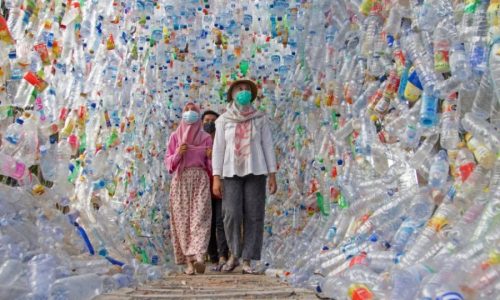In a condition where global funding and the government have more focus on large-scale power plants, community-based small-scale power plants have the potential to provide electricity for people in remote and underdeveloped regions, a study has revealed.
An Indonesian study case, presented in a report titled Banking on Renewables: Powering People, Protecting the Planet released by Resource, Trend Asia and a coalition of international civil society groups, reveals that community-based small-scale power plants, such as micro-hydropower plants developed in Ciptagelar indigenous village, Sukabumi regency, West Java and in Batu Sanggan village, Kampar regency, Riau, have provided an answer to people’s electricity needs in areas which are out of the State power utility PT PLN to reach.
The report explores three key principles that should be enforced by energy transitions. First, energy transition should finance 100 percent renewable energy without fossil energy footprints. Second, it should ensure democratic and inclusive energy system and third, it should prioritize people and nature’s interest.
“The contruction of the 70-kilowatt mini hydropower plant in the Kasepuhan Ciptagelar indigenous village was financed by the CSR fund of a Japanese company. But, the aid did not cover total cost for maintenance and long-term repair of the power plant. Still, the community has collectively been able to manage the plant until today,” Beyrra Trisdian, Trend Asia Campaigner for Renewable Energy, said in a statement on Thursday, October 31, 2024.
A similar story is found in Kampar regency, Riau. Residents of Batu Sanggan village, which is located in the middle of the forest and can only be accessed by boat, could have been enjoying electricity till date, thanks to the Batu Sanggan mini hydropower plant.
The village community was actively involved in the planning, construction and financing phases of the mini hydropower plant with support from the government. Unfortunately, after its completion, the government abandoned the project without providing sufficient training for maintenance. As a consequence, the power plant operation was abandoned for several years before the village secured aid for technical trainings. Locals could have since then enjoyed enough electricity for their household needs and to support small-scale industry of boat making.
Obsessed with large-scale power plants
According to Beyrra Trisdian, the government should not underestimate community-initiated power plants. Construction of small-scale power plants are environmentally friendly and democratic and the fact that it was the locals who took the initiatives and were involved in the process, chances are small that they become victims of environmental impact or eviction.
“Locals also know more of their needs and type of power plant that fit the local geographical aspect. Besides, hydropower is clean energy and in line with the government’s electricity program for remote and underdeveloped areas in Indonesia, such as the settlements in the middle of the forest or on small islands that are not touched by the PLN network,” Beyrra said.
“Unfortunately, the government and financier are obsessed with large-scale power plant, which has frequently been blamed for the environmental damage, eviction of the surrounding communities and harmful social impact,” he added.
Beyrra cited the condition of the Jatigede hydropower plant, which was established on a 4,896-hectare area spread in 30 villages in Sumedang, West Java. Since its construction in the 1980’s until its operational target in 2024, the power plant has not involved local community in its plan and development. As a consequence, the local community has staged protest 218 times against the eviction of more than 11,400 families.
All farmers working in the area have lost their jobs, while the dam construction also destroyed 48 historical sites of the ancient Sumedang kingdom as well as destroying the culture and way of life of the indigenous community.
There are lots of people awaiting compensation until now, although financial compensation cannot replace the loss of customary values and way of life of the community.
The same goes for the planned Tampur hydropower plant in Aceh, which is feared to submerge the elephant corridor and threaten biodiversity in the Mount Leuser conservation area, home to Sumatran tigers and rhinos. It also threatens the living space of the Gayo indigenous people and their traditional way of life. Besides, communities will also inevitably be displaced and uprooted from their traditional livelihoods.
The study shows that being “clean” is simply not enough for an equitable energy transition. Its process must be democratic, involving the communities, and protective to the nature and the people’s basic rights. In ensuring these values, governments and Multilateral Development Banks should consider community-based power generation as one of the solutions to energy transition.









